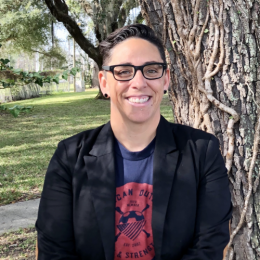
Deah Lieurance, an assistant professor of invasive species biology and management at Penn State, will discuss “Expanding the predictive ‘toolbox’ to stop invasive species dead in their tracks” on Dec. 2 at Wright State.
Deah Lieurance, Ph.D., a Penn State faculty member and Wright State University alum, will discuss ways to stop the spread of invasive species during the Wayne Carmichael Lecture in Environmental Sciences.
Lieurance’s lecture, “Expanding the predictive ‘toolbox’ to stop invasive species dead in their tracks,” will take place on Monday, Dec. 2, at 6 p.m. in 101 Neuroscience Engineering Collaboration Building.
The talk will be preceded by a reception at 5 p.m. in the Neuroscience Engineering Collaboration Building lobby.
Lieurance, who earned a Ph.D. in environmental services at Wright State, is an assistant professor of invasive species biology and management at Penn State University.
She has worked for over 12 years in invasive species prevention and risk assessment is currently building the Penn State University Invasive Species Risk Analysis Program, a cooperative extension program for the categorization of non-native species serving the Pennsylvania Governor’s Invasive Species Council.
She is also developing a research program to investigate the effect of climate change on the ecophysiology and chemical ecology of invasive plants and how that might shape plant herbivore interactions.
Lieurance had led scans for invasive species threats in the United States, the U.S. Virgin Islands, and Puerto Rico, as well as a national scan for plants in trade and participated in a project ranking secondary spread pathways in the National Early Detection and Rapid Response Framework. She also coordinated the University of Florida’s risk assessment program for non-native plants.
Her research spans plant-herbivore interactions, enemy release and biocontrol development for key invasive plants.
The lecture is sponsored by Wright State’s Environmental Sciences Ph.D. Program, the College of Science and Mathematics, the Department of Biological Sciences and Pi Epsilon, the environmental sciences honor society. The annual lecture is named in honor of Wayne Carmichael, the first director of the Environmental Sciences Ph.D. Program.

 Wright State names Rajneesh Suri dean of Raj Soin College of Business
Wright State names Rajneesh Suri dean of Raj Soin College of Business  ‘Only in New York,’ born at Wright State
‘Only in New York,’ born at Wright State  Wright State president, Horizon League leaders welcome new commissioner
Wright State president, Horizon League leaders welcome new commissioner  Wright State celebrates homecoming with week-long block party
Wright State celebrates homecoming with week-long block party  Wright State baseball to take on Dayton Flyers at Day Air Ballpark April 15
Wright State baseball to take on Dayton Flyers at Day Air Ballpark April 15 